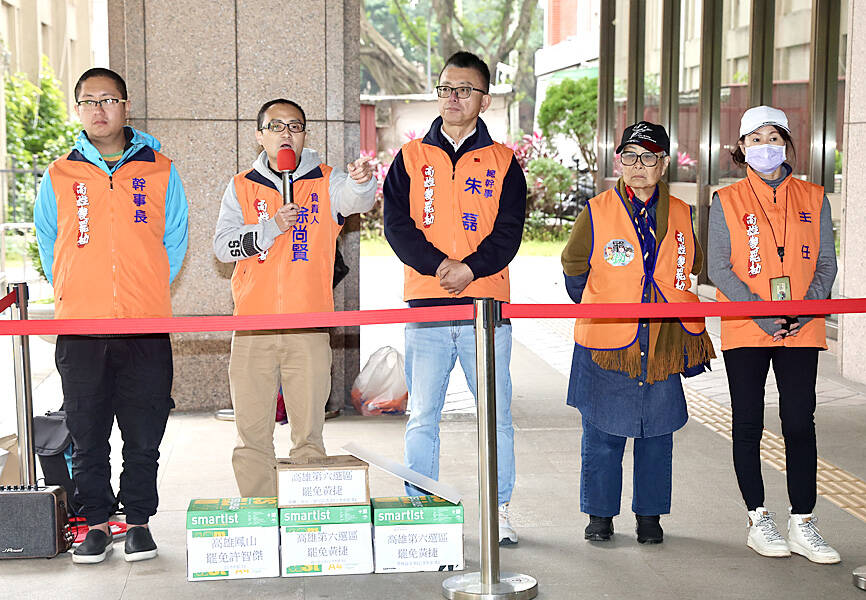Hsu Shang-hsien (徐尚賢), the leader of a recall vote campaign organization targeting two Democratic Progressive Party (DPP) lawmakers in Kaohsiung, has been detained following questioning over alleged forgery and contraventions of the Personal Data Protection Act (個人資料保護法).
The Kaohsiung District Court on Saturday approved local prosecutors’ request to detain Hsu and hold him incommunicado for two months. The court cited concerns that he could tamper with evidence or collude with other people involved in the case.
According to court documents released yesterday, Hsu admitted that many of the signatures on his organization’s recall petition documents were not provided by actual supporters, but were written by himself or campaign volunteers.

Photo: CNA
Although Hsu denied illegally collecting and using personal data, the court said digital evidence on two confiscated phones and witness testimony pointed to “suspected serious illegality.”
The Kaohsiung District Prosecutors’ Office said that Hsu deleted files and chat records related to the recall vote campaign and advised others, including a man named Chu Lei (朱磊) and a woman surnamed Huang (黃), on how to respond to judicial inquiries.
Huang was released without bail after being questioned on Friday and Chu was released on bail of NT$150,000 early on Saturday, prosecutors said.
The court said that the facts remain unclear and that the risk of collusion with others who have not yet been questioned justified Hsu’s pretrial detention.
Hsu ran the campaign organization “Double Strike Petition Headquarters,” which coordinated signature collections for campaigns against DPP lawmakers Hsu Chih-chieh (許智傑) and Huang Jie (黃捷), both of whom represent Kaohsiung electoral districts in the legislature.
The case is one of several ongoing investigations into alleged illegality in recall vote campaigns targeting DPP lawmakers, which have led opposition politicians to accuse the ruling party of using the judiciary to “persecute” its political opponents.
The Chinese Nationalist Party (KMT) protested outside the Taipei District Prosecutors’ Office last week and is urging Taiwanese to assemble in front of the Presidential Office Building on Saturday.
The DPP has denied the allegation and accused the KMT of threatening Taiwan’s social stability and democracy.
Last week, separate investigations by Taipei and New Taipei City prosecutors resulted in raids and the arrests of activists who had allegedly forged signatures and contravened data protection laws in their recall campaigns against DPP lawmakers.
According to the Public Officials Election and Recall Act (公職人員選舉罷免法), a public vote could be triggered if campaigners are able to collect signatures from 1 percent of district voters in the first round and 10 percent in the second.

‘FORM OF PROTEST’: The German Institute Taipei said it was ‘shocked’ to see Nazi symbolism used in connection with political aims as it condemned the incident Sung Chien-liang (宋建樑), who led efforts to recall Democratic Progressive Party (DPP) Legislator Lee Kun-cheng (李坤城), was released on bail of NT$80,000 yesterday amid an outcry over a Nazi armband he wore to questioning the night before. Sung arrived at the New Taipei City District Prosecutors’ Office for questioning in a recall petition forgery case on Tuesday night wearing a red armband bearing a swastika, carrying a copy of Adolf Hitler’s Mein Kampf and giving a Nazi salute. Sung left the building at 1:15am without the armband and apparently covering the book with a coat. This is a serious international scandal and Chinese

PERSONAL DATA: The implicated KMT members allegedly compiled their petitions by copying names from party lists without the consent of the people concerned Judicial authorities searched six locations yesterday and questioned six people, including one elderly Chinese Nationalist Party (KMT) member and five KMT Youth League associates, about alleged signature forgery and fraud relating to their recall efforts against two Democratic Progressive Party (DPP) legislators. After launching a probe into alleged signature forgery and related fraud in the KMT’s recall effort, prosecutors received a number of complaints, including about one petition that had 1,748 signatures of voters whose family members said they had already passed away, and also voters who said they did not approve the use of their name, Taipei Deputy Chief Prosecutor

UNDER ATTACK: Raymond Greene said there were 412 billion malicious threats in the Asia-Pacific region in the first half of 2023, with 55 percent targeting Taiwan Taiwan not only faces military intimidation from China, but is also on the front line of global cybersecurity threats, and it is taking action to counter those attacks, President William Lai (賴清德) said yesterday. Speaking at the opening of this year’s Cybersec Expo in Taipei, the president assured foreign diplomats and exhibitors that Taiwan remained committed to strengthening its defense against cyberattacks and enhancing the resilience of its digital infrastructure. Lai referenced a report from the National Security Bureau (NSB) indicating that the Government Service Network faced an average of 2.4 million intrusion attempts daily last year, more than double the figure

Retired US general Robert B. Abrams reportedly served as adviser to Chief of the General Staff Admiral Mei Chia-shu (梅家樹) during the Ministry of National Defense’s computer-simulated war games in the buildup to this year’s 41st annual Han Kuang military exercises, local media reported yesterday. For 14 days and 13 nights starting on April 5 and ending yesterday, the armed forces conducted the computer-simulated war games component of the Han Kuang exercises, utilizing the joint theater-level simulation system (JTLS). Using the JTLS, the exercise simulated a continuous 24-hour confrontation based on scenarios such as “gray zone” incursions and the Chinese People’s Liberation